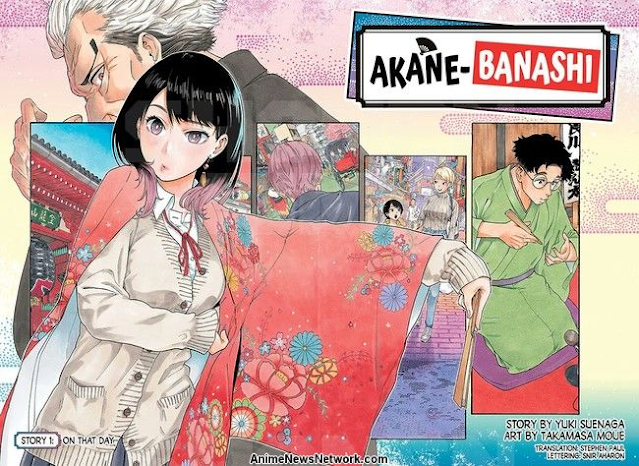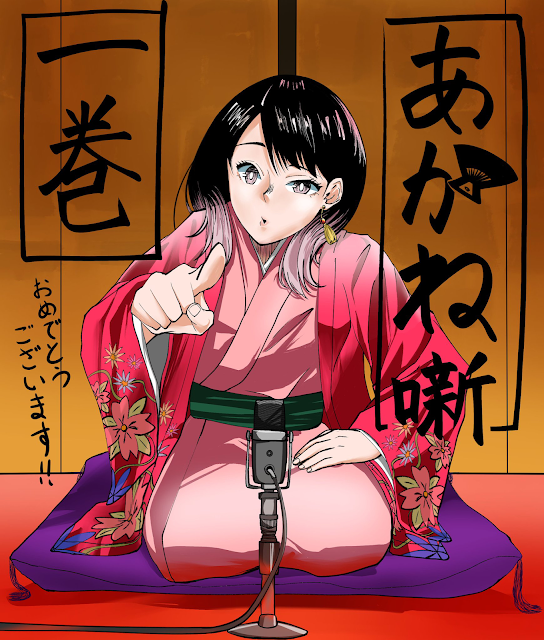For good reason, Akane-banashi is praised by the creators of One Piece and Neon Genesis Evangelion
I began reading Akane-banashi because I didn't want to begin a manga with hundreds of chapters. I expected to be able to sample a new series briefly, cancel my Shonen Jump subscription, and then return to working on my game backlog. But Akane-banashi completely caught me off guard with its expressive art, lighthearted comedy, and dramatic arcs. Several months later, rereading Akane-banashi is still the main reason I keep paying for that subscription, and reading a new (free) chapter every Sunday is my favorite part of the weekend.
Akane-banashi is the story of Akane Osaki, a teenage girl who pursues rakugo, a theatrical art form. A single performer tells comedic or dramatic stories using only body language, facial expressions, and varying tone in rakugo. The artist must portray every character in the story, and rakugo skits always feature multiple characters.
Akane's father was unceremoniously expelled from the rakugo school several years ago, so she's pursuing professional rakugo to both find out why he was expelled and to redeem his art in the eyes of the public. Unfortunately, the man who destroyed her father's career is also the most powerful figure in the entire rakugo world, so making people laugh is fraught with danger.
Despite its emotionally charged premise, Akane-banashi is a lighthearted series that shines when it demonstrates the creators' deep love of rakugo. The performances are incredibly entertaining to read because the artist draws hilariously exaggerated expressions on the beautiful and graceful performers. In most fictional works, leading actors are only required to be attractive and charming. They can also be slovenly, arrogant, and obnoxious in the rakugo of Akane-banashi.
Without the use of props or outside assistance, each performance transforms the artist into someone entirely new. In one panel, a rakugo performer is a cowardly old man who overspends. In another, he's the obstinate and devious wife. And the drama is simple to follow because the manga tends to over-narrate the performances. If theater is deception, Akane-rakugo banashi's is sincere deception. The jokes are simple, but everyone is in on the joke.
I like rereading Akane-banashi as a gentle palate cleanser before diving into other shonen manga. Despite the recent arc's overall competitive atmosphere, its sense of humor remains irreverent without being mean-spirited or crass. The characters are respectful of one another, aware of one another's creative abilities, and never dismiss the competition. The stakes are still high, and I want Akane to impress all the adults who dismiss her because she is young. But I'm having so much fun watching her grow as an artist that I'm not in any hurry for her to get major "wins."
This is a refreshing change from most shonen manga, such as Demon Slayer, in which the protagonist nearly destroys themselves to advance to the next power level. I had to stop reading slice-of-life manga such as Bakuman because it seemed to advocate for burnout. Akane-banashi seduces you early on, gradually immerses you in the characters, and draws you in with its own dramatic skill.
The slower pace extends to how the stories are structured. Akane-banashi frequently takes several chapters for a rakugo performance to reach its final punchline. The point isn't the joke itself. Instead, the narration of other characters in the audience provides much of the drama.
Akane-banashi shines when the rakugo performers' peers and colleagues meticulously break down and analyze the theatrical decisions they make in their performance, much like how a friend explaining a sports game is often more interesting than the game itself. That's why, despite playing the same game, some streamers are more entertaining to watch than others. Akane-banashi isn't just adamant about preserving the authenticity of rakugo; it's also very deliberate about ensuring that the audience has a good time.
I'm not the only one who enjoys shonen manga. Eiichiro Oda, the famous creator of One Piece, praised the first volume of Akane-banashi. Recently, Hideaki Anno, the director of Neon Genesis Evangelion, joined him in recommending the series to new readers. Akane-banashi is a newcomer who deviates from many shonen manga conventions, but it's a confident work that always seems to land on its feet in its storylines.
#Anime #ShonenJump #OnePiece #NeonGenesisEvangelion #Manga
SOURCE: kotaku
What do you think of this blog? Write down at the COMMENT section below.





No comments:
Post a Comment